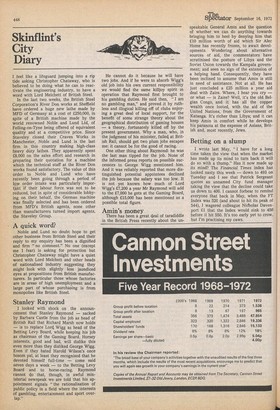Skinflint's City Diary
I feel like a lifeguard jumping into a rip tide asking Christopher Chataway, who is believed to be doing what he can to reactivate the engineering industry, to have a word with Lord Melchett of British Steel.
In the last two weeks, the British Steel Corporation's River Don works at Sheffield have ordered a huge new lathe made by MFD of Germany at a cost of £250,000, in spite of a British machine made by the world renowned Noble and Lund Ltd, of Felling-on-Tyne being offered of equivalent quality and at a competitive price. Since Staveley closed their Craven Works in Manchester, Noble and Lund is the last firm in this country making high-class heavy diity lathes. They apparently spent £8,000 on the sales effort and research in preparing their quotation for a machine which the technical staff at the River Don works found satisfactory. The value of this order to Noble and Lund who have recently been going through a period of low order intake was particularly important if their labour force was not to be reduced, but in spite of considerable lobbying on their behalf, the German machine was finally selected and has been ordered from MFD's British agents, none other than manufacturers turned import agents, the Staveley Group.
A quick word?
Noble and Lund no doubt hope to get other business from British Steel and their reply to my enquiry has been a dignified and firm "no comment." No one (except me I fear) is asking for protection but Christopher Chataway might have a quiet word with Lord Melchett and other heads of nationalised industry suggesting they might look with slightly less jaundiced eyes at propositions from British manufacturers. In particular those whose factories are in areas of high unemployment and a large part of whose purchasing is from monopolies like British Steel.
Stanley Raymond
I looked with shock on the announcement that Stanley Raymond — sacked by Barbara Castle from the job as head of British Rail that Richard Marsh now holds — is to replace Lord Wigg as head of the Betting Levy Board, while keeping his job as chairman of the Gaming Board. Horsey interests, good and bad, will dislike this even more than they disliked George Wigg. Even if they hated Harold Wilson's once bosom pal, at least they recognised that he devoted himself full-time — some said seven days a week — to the Betting Levy Board and to horse-racing. Raymond cannot do that, though, in awful ministerial newspeak we are told that his appointment signals "the rationalisation of public policy in a field where the interests of gambling, entertainment and sport overlap." He cannot do it because he will have two jobs. And if he were to absorb Wigg's old job into his own current responsibility we would find the same killjoy spirit in operation that Raymond first brought to his gambling duties. He said then, "I am no gambling man," and proved it by ruthless and illogical killing off of clubs enjoying a great deal of local support, for the benefit of some strange theory about the geographical distribution of gaming houses — a theory, fortunately killed off by the present government. Why a man, who, in the judgment of his minister, failed at British Rail, should get two plum jobs escapes me: it cannot be for the good of racing.
One other thing about Raymond: he was the last man tipped for the job. None of the informed press reports on possible successors to George Wigg mentioned him. And it was reliably reported that more distinguished potential appointees declined the job because the salary was too low. It is not yet known how much of Lord Wigg's £7,200 a year Mr Raymond will add to the £7,000 he gets at the Gaming Board, although £15,000 has been mentioned as a possible total figure.
Amin's money
There has been a great deal of taradiddle in the British Press recently about the un speakable General Amin and the question of whether we can do anything towards bringing him to heel by denying him that £10 million worth of aid which Sir Alec Home has recently frozen, to await developments. Wondering about alternative sources of aid, the commentators have scrutinised the posture of Libya and the Soviet Union towards the Kampala government; and seen no sign of the extension of a helping hand. Consequently, they have been inclined to assume that Amin is still in need of assistance. Not at all. He has just concluded a £25 million a year aid deal with Zaire. Where, I hear you cry — or what — is Zaire? Well, it's the old Belgian Congo, and it has all the copper wealth once looted, with the aid of the United Nations, from the Government of Katanga. It's richer than Libya; and it can keep Amin in comfort while he develops his paranoia at the expense of Asians, British and, most recently, Jews.
Betting on a slump
I wrote last May, "I have for a long time taken the view that when the market has made up its mind to turn back it will do so with a thump." Has it now made up its mind? The Financial Times index has looked nasty this week — down to 493 on Tuesday and I see that Patrick Sergeant quotes an unnamed City fund manager taking the view that the decline could take us down to 400. I cannot forbear to remind everyone that back in May, when the FT Index was 520 (and about to hit its peak of 544), 1 wagered colleague Nieholas Davenport £1 that the Index would sink to 450 before it hit 550. It's too early yet to crow, but I'm practising my caws.


































 Previous page
Previous page